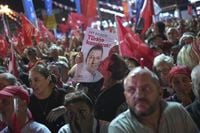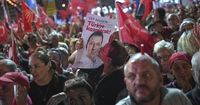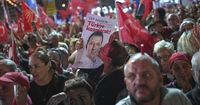Turkish politics has once again been shaken by a wave of arrests, as authorities detained Hasan Mutlu, the mayor of Istanbul’s Bayrampasa district, along with 47 other officials on Saturday, September 13, 2025. The detentions, ordered by the Istanbul chief prosecutor’s office, are part of a broad investigation into alleged extortion, bribery, fraud, and bid rigging within the Bayrampasa municipality, according to the state-run Anadolu Agency and TRT Haber.
The dramatic early morning operation saw police raiding 72 locations across Istanbul, seizing documents and taking Mutlu and several of his deputies into custody. The allegations are serious—bribery, embezzlement, fraud, and bid rigging—but Mutlu wasted no time in responding publicly. In a statement posted on X, he declared, “What is happening consists of political operations and baseless slander. Be assured that, together with you, the valued residents of Bayrampasa, we will overcome these slanders and these acts of dishonesty.” His words, echoed across Turkish media, reflect the deepening sense of crisis within the country’s main opposition party, the Republican People’s Party (CHP).
Mutlu’s arrest is not an isolated event. In recent months, more than a dozen mayors from the CHP and hundreds of municipal officials have been arrested on similar corruption charges. Among them is Istanbul’s former mayor and current CHP leader, Ekrem Imamoglu, who many view as President Recep Tayyip Erdogan’s most formidable challenger in the next presidential elections. Imamoglu’s detention in March 2025 sparked the largest protests Turkey has seen in a decade, as reported by TRT Haber and other outlets. The public outcry was swift and widespread, signaling the high political stakes at play.
Imamoglu’s legal troubles have only intensified since his arrest. On Friday, September 12, 2025, he stood trial on charges of falsifying his university degree—a charge he denies. Prosecutors are seeking a jail term of up to eight years and nine months, along with a ban on political activities, a move that could sideline one of the opposition’s most prominent figures just as the country gears up for another round of elections. The next hearing is scheduled for October 2025, keeping Imamoglu’s fate—and that of the opposition—in suspense.
The CHP has not minced words about what it sees as the true motive behind the arrests. Party leaders describe the ongoing detentions as a government clampdown designed to weaken the opposition and clear the way for Erdogan to secure another five years in office at the next elections, scheduled for 2028, or sooner if snap elections are called. “The arrests and allegations are part of a government offensive to weaken the opposition and clear the way for another five years in office for Erdogan,” CHP officials have stated repeatedly, as reported by Anadolu Agency and the Associated Press.
For its part, the government categorically denies these accusations, insisting that Turkey’s courts are independent and that the investigations are based solely on evidence of criminal wrongdoing. Officials have pointed to the scale and scope of the investigations, emphasizing that the law applies equally to all, regardless of political affiliation. Still, the timing and focus of the arrests—targeting opposition strongholds and high-profile figures—have fueled suspicions and debate within Turkish society and beyond.
The political climate is further complicated by a pivotal court case scheduled for Monday, September 15, 2025, in Ankara. The court is set to decide whether to annul the outcome of the CHP’s 2023 party congress—a decision that could have far-reaching consequences for the party’s leadership and internal stability. If the court rules to annul the congress, CHP leader Ozgur Ozel, who emerged as the party’s chairman at that meeting, could be stripped of his position. Such a move would almost certainly plunge the party into disarray, just as it faces mounting pressure from both the ruling party and its own base.
The stakes are high for the CHP, which made significant gains in the 2024 local elections. The party not only retained control of key cities like Istanbul and Ankara but also made inroads into traditional strongholds of Erdogan’s Justice and Development Party (AKP). These victories were widely seen as a sign of growing public dissatisfaction with the government and a potential turning point in Turkish politics. Now, with its top leaders facing legal jeopardy and the threat of internal upheaval, the party’s future hangs in the balance.
Observers note that the crackdown on opposition officials is not without precedent in Turkey’s turbulent political history. Over the past decade, the country has witnessed repeated waves of arrests and purges targeting political rivals, journalists, academics, and civil society leaders. Each episode has left its mark, deepening divisions and raising questions about the rule of law and the health of Turkish democracy. The current round of arrests, however, appears particularly consequential, given the proximity to key elections and the prominence of those targeted.
Meanwhile, President Erdogan and his supporters maintain that the government is simply enforcing the law and rooting out corruption wherever it exists. They argue that the opposition’s claims of political persecution are exaggerated and self-serving, intended to deflect attention from genuine wrongdoing. “Turkey’s courts are independent,” government spokespeople have insisted, as reported by Anadolu Agency and the Associated Press. Still, the optics of the crackdown—coming on the heels of opposition electoral gains—have fueled skepticism among many Turks and international observers alike.
As the Monday court hearing approaches, all eyes are on Ankara. The outcome could reshape the opposition’s leadership and strategy, with ripple effects across the political landscape. The CHP’s ability to weather this storm will depend not only on the courts but also on its capacity to rally supporters, maintain unity, and articulate a compelling alternative to the ruling party. For many in Turkey, the events of the past week have underscored the fragility—and the high stakes—of democratic politics in a country where the line between law and politics is often blurred.
For now, the residents of Bayrampasa, Istanbul, and beyond are left to watch and wait as the drama unfolds. The coming days promise more twists and turns, as the fate of the opposition—and perhaps the future direction of Turkish democracy—hangs in the balance.



